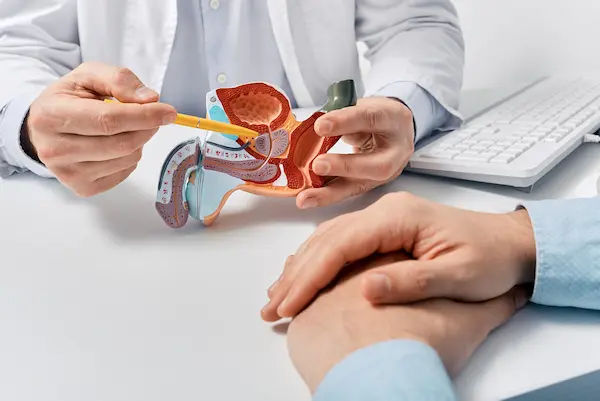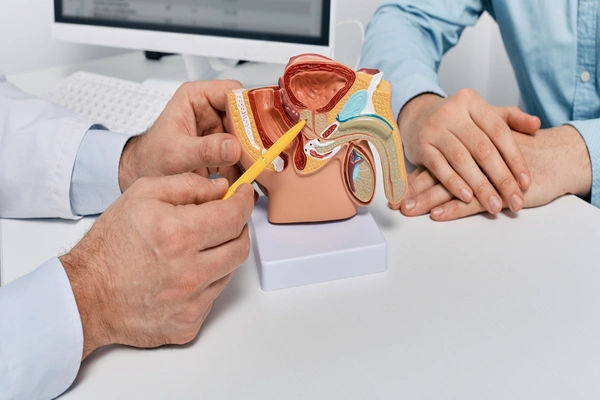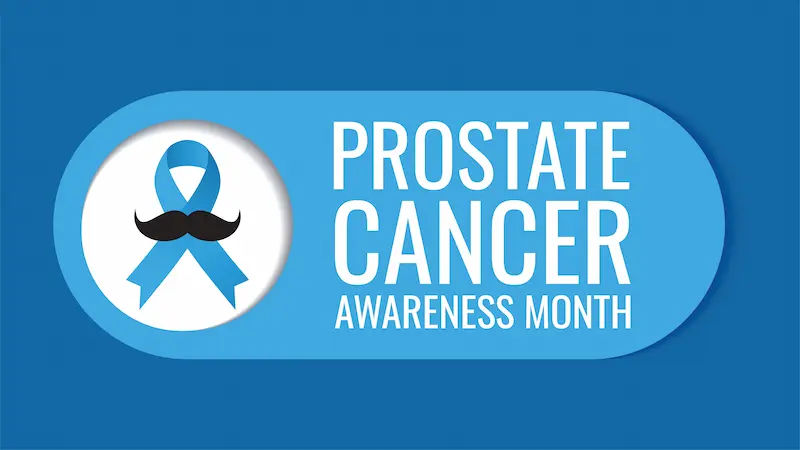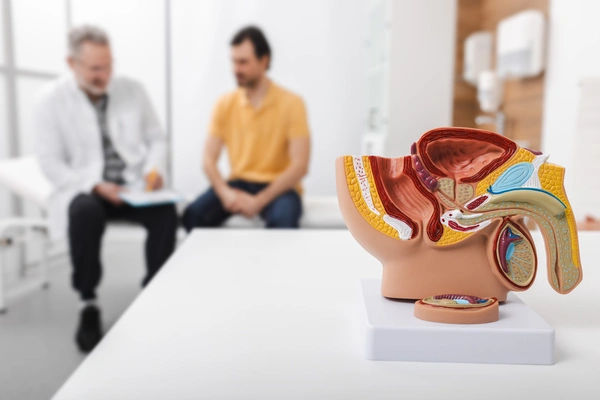Prostate Cancer: Symptoms, Causes and Types
Learn about prostate cancer, its symptoms, causes, and types. Understand risk factors and the importance of early detection for effective treatment.

Written by Dr. Rohinipriyanka Pondugula
Reviewed by Dr. Vasanthasree Nair MBBS
Last updated on 13th Jan, 2026
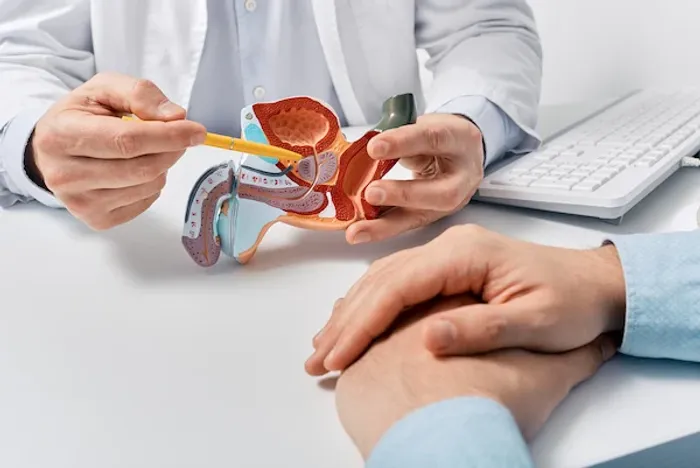
Introduction
Prostate cancer is one of the most common cancers affecting men worldwide, but it's also one of the most misunderstood. Many men live with early-stage prostate cancer for years without any symptoms, while others may experience noticeable changes that signal it's time to see a doctor. Understanding what leads to this disease, recognizing its potential signs, and knowing that there are different types of prostate cancer are crucial steps in taking control of your health. This guide will demystify the condition, moving beyond the basics to explore the nuances of symptoms and the important distinctions between various cancer types. Whether you're proactively monitoring your health or seeking answers for specific concerns, knowledge is your most powerful tool in the fight against prostate cancer.
What is the Prostate and What Does It Do?
The prostate is a small, walnut-sized gland that is part of the male reproductive system. Its primary function is to produce seminal fluid, the liquid that nourishes and transports sperm. The prostate is located just below the bladder and surrounds the urethra, the tube through which urine and semen exit the body. Because of its location, when the prostate becomes enlarged or affected by cancer, it directly impacts urinary function. It's important to distinguish between normal age-related enlargement (Benign Prostatic Hyperplasia or BPH) and malignant growth, as their symptoms can often overlap.
Consult a Urologist for the best advice
Early Signs and Symptoms of Prostate Cancer
In its earliest stages, prostate cancer often is asymptomatic; it shows no signs at all. This is why screening discussions with a healthcare provider are so vital. When symptoms do appear, they are frequently linked to the tumor pressing on the urethra.
Urinary Changes: The Most Common Indicators
These are often the first red flags that men notice. Because the prostate surrounds the urethra, any growth can constrict it, leading to:
Frequent urination, especially at night (nocturia).
A weak or interrupted urine stream.
Difficulty starting or stopping urination.
A feeling that the bladder isn't fully empty.
Dribbling urine after you finish.
Pain or a burning sensation during urination.
It's critical to note that these symptoms of prostate issues are most commonly caused by BPH, not cancer. However, any persistent urinary changes warrant a medical evaluation to rule out malignancy.
Pain and Discomfort: Signs of Advanced Disease
When prostate cancer advances and spreads (metastasizes), it can cause symptoms in other parts of the body:
Bone pain, particularly in the back, hips, or pelvis, which may be constant or come and go.
Unexplained weight loss.
Loss of appetite.
Pain in the testicles.
Erectile Dysfunction as a Potential Symptom
While erectile dysfunction (ED) has many causes, it can sometimes be related to prostate cancer, especially if it develops alongside other urinary symptoms. The nerves responsible for erections run alongside the prostate and can be affected by a growing tumor.
Unique Insight: Many men dismiss early urinary symptoms as a normal part of aging. However, a sudden change in urinary habits, like suddenly needing to get up four times a night when you previously slept through, is a more significant indicator than a gradual change over many years.
What Actually Leads to Prostate Cancer?
The exact causes of prostate cancer remain unknown. Doctors believe it begins when cells in the prostate develop changes (mutations) in their DNA, causing them to grow and divide more rapidly than healthy cells. These abnormal cells can form a tumor that may invade nearby tissue or spread elsewhere.
Primary Risk Factors You Can't Change
Age: Your risk increases significantly after age 50.
Race: For reasons not yet fully understood, Black men have a greater risk of prostate cancer than men of other races. They are also more likely to have aggressive or advanced disease.
Family History: If men in your family have had prostate cancer, your risk may be elevated. Inherited gene mutations (like BRCA1 or BRCA2) also play a role.
Controllable Risk Factors (Diet, Lifestyle)
Diet: A diet high in red meat and high-fat dairy products and low in fruits and vegetables may slightly increase risk.
Obesity: Obese men diagnosed with prostate cancer may be more likely to have advanced disease that's harder to treat.
Not All Prostate Cancers Are the Same: Understanding the Types
This is a key area often glossed over. The type of prostate cancer you have dramatically influences your treatment options and prognosis.
Adenocarcinoma: The Vast Majority of Cases
Nearly all prostate cancers (over 95%) are adenocarcinomas, which develop from the gland cells that make the seminal fluid.
Acinar Adenocarcinoma
This is the most common subtype, originating in the acini (the glandular lining of the prostate). When people talk about prostate cancer, they are almost always referring to this type.
Ductal Adenocarcinoma
A rarer, often more aggressive subtype that starts in the cells lining the ducts of the prostate. It tends to spread more quickly than acinar adenocarcinoma.
Rare and Aggressive Types of Prostate Cancer
These account for a very small percentage of cases but behave very differently from adenocarcinomas.
Small Cell Carcinoma (Neuroendocrine)
This is a very aggressive type of prostate cancer made up of small round cells. It is often diagnosed at an advanced stage, tends to grow and spread quickly, and doesn't produce much PSA, making it harder to detect with standard screening.
Transitional Cell Carcinoma
Also known as urothelial carcinoma, this cancer actually starts in the urethra or bladder and can invade the prostate. It is treated more like bladder cancer than prostate cancer.
Sarcomas and Other Rare Cancers
These begin in the soft tissues of the prostate (muscle, fat, blood vessels) and are extremely rare. Their causes and symptoms can be distinct from typical prostate cancer.
Unique Insight: The Gleason score, obtained from a biopsy, is a critical tool for understanding your specific adenocarcinoma. It grades the cancer's aggressiveness on a scale, helping to distinguish between slow-growing ("low-grade") cancers that may only require active surveillance and aggressive ("high-grade") cancers that need immediate treatment.*
How Prostate Cancer is Diagnosed and Staged
If symptoms or screening tests (like a PSA blood test or DRE) suggest an issue, the next step is typically a prostate biopsy, where small tissue samples are taken and analyzed. This confirms the diagnosis and identifies the cancer type and Gleason score. Further tests (CT, MRI, bone scans) are then used to determine the stage, whether it's confined to the prostate or has spread. This entire diagnostic picture is essential for crafting an effective treatment plan. If your PSA levels are elevated or you are experiencing persistent symptoms, consult a urologist online with Apollo24|7 for further evaluation and to discuss the need for a biopsy.
Get Your Health Assessed
Conclusion and Next Steps
Understanding the signs and types of prostate cancer empowers you to be an active participant in your health journey. While the thought of cancer can be daunting, knowledge dispels fear. Remember that not all prostate cancers are aggressive; many are slow-growing and may only require careful monitoring. The key is to not dismiss changes in your body, particularly urinary habits, as inevitable signs of aging.
The most important step you can take is to engage in open, honest conversations with a healthcare professional. They can help you assess your personal risk, interpret any symptoms, and guide you on whether screening is right for you. If you have a family history or are experiencing any persistent symptoms, don't wait. Book a consultation with a doctor on Apollo24|7 to get personalised advice and a clear path forward. Early detection and a precise understanding of your specific diagnosis are the cornerstones of successful outcomes.
Consult a Urologist for the best advice
Consult a Urologist for the best advice

Dr. Rohit Bhattar
Uro Oncologist
14 Years • MBBS, MS, MCh (Urology), Fellowship in Uro-oncology and Robotic Urology (United Kingdom)
Ahmedabad
Apollo Hospitals Gandhinagar, Ahmedabad
(100+ Patients)

Dr. Moin Mohammed Bavakatti
Urologist
13 Years • MBBS, MS (General Surgery), Mch (Urology), DNB (Urology), Diploma in Minimal Access Surgery, Fellow of Internal College of Robotic Surgeons), Vinci Surgical system, Fellow in Endocrinology, Clinical and Research fellow in Laparoscopic Urology, Laser Endourology & Laparoscopic & Robotic Urology, Fellowship in 3D laparoscopic Urology
Bengaluru
Dr Moin Mohammed Bhavikatti Clinic, Bengaluru
(150+ Patients)

Dr. Kunal Kumar Mehar
Urologist
10 Years • Mbbs, Ms, Mch
Bengaluru
Apollo Medical Center, Marathahalli, Bengaluru
Dr. J Chaithanya
Urologist
6 Years • MBBS MS GENERAL SURGERY MCH UROLOGY
Bengaluru
Apollo Medical Center, Marathahalli, Bengaluru

Dr. Yogesh Taneja
Urologist
15 Years • MBBS , MS (General surgery), DNB (Genito Urinary Surgery)
Gurugram
Procyon Health, Gurugram

